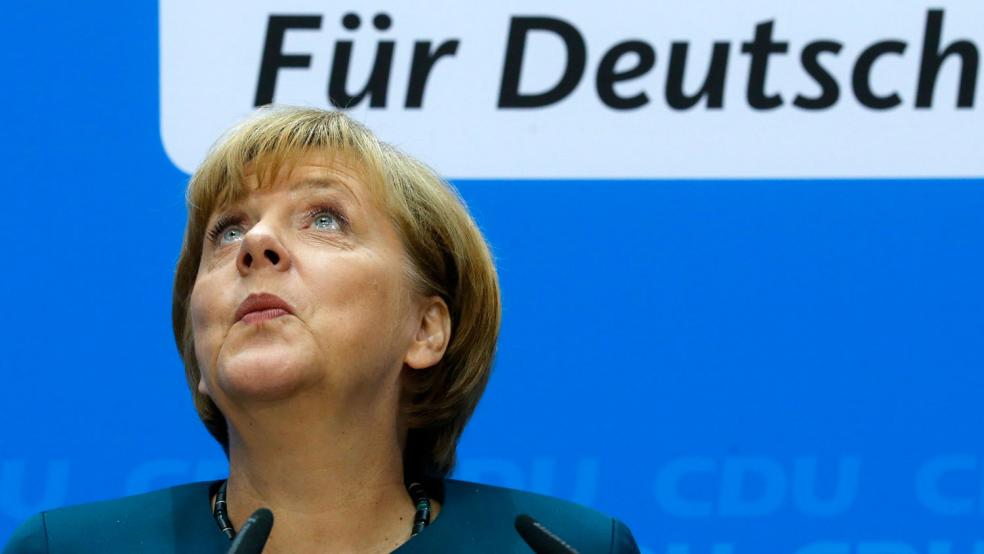Berlin--German Chancellor Angela Merkel may have won another decisive four-year term yesterday in Berlin, but not everyone in the Eurozone is happy about it
The 59-year-old Merkel is only the third person since the end of World War II to occupy Germany’s highest office three times. Although she was expected to win, the size of her victory is a ringing endorsement of her policies, credited in Germany with saving the eurozone.
RELATED: ‘MAMA’ MERKEL MAY WIN GERMANY BUT NOT THE EUROZONE
Merkel came close to winning an absolute majority of German voters, falling just short of a threshold that would allow her center-right Christian Democratic Union to govern on its own. In the coming weeks, it will form a grand coalition with another party, most likely the left-leaning Social Democratic Party.
Appearing jubilant by her modest standards Merkel said last night in Berlin, “We are waiting for the final results. . . but we can already celebrate today, because we really did well. This is a fantastic result.”
THE GERMAN JUGGERNAUT
Unemployment in Germany was close to 12 percent when she took office in 2005. Now, it hovers at 5 percent. Germany is by far the strongest economy in Europe – and Merkel is Europe’s undisputed leader.
Her austerity policies and her pragmatic leadership style are also credited with saving the European Union. In debt-plagued countries like Greece and Portugal, she’s been vilified for forcing economic hardship. But her refusal to take radical stimulus action to stem the crisis and her insistence on treading the middle road are seen by many as the reason the European Union still exists.
Still, her pragmatism, along with her refusal to lead forcefully, is seen by many as her greatest weakness. Her failure to firmly grasp the mantle of European leadership leaves the eurozone vulnerable to the same kinds of problems that caused the crisis in the first place. Many prominent thinkers within her own country also believe she is leading Germany down an unsustainable path.
Here are three reasons Merkel’s victory is bad not just for Europe, but for Germany as well:
- While Germany’s economy may be growing, the rest of Europe is not. Germans are largely insulated from the economic hardships that much of the rest of Europe is dealing with. It’s hard for them to relate to 25 percent unemployment of young people in Spain; only 57 percent of working-aged people in Italy have a job; and Greece may need a third bailout this fall. None of these countries are expected to return to growth any time soon. In fact, it was France and Germany that finally pulled the eurozone out of recession last month. Their success masked failures elsewhere.
- Merkel refuses to lead Europe as a whole. The German chancellor’s well known pragmatism prevents her from being the strong leader Europe needs. “Merkel is in a position to offer a direction, but doesn’t have any direction. Rather, she drives around in circles,” Peer Steinbrueck, her failed challenger, said at a rally in Berlin last week. Polls show this message failed to resonate with the Germans, who have shown no desire to be Europe’s leader. But the decision isn’t theirs to make: Merkel is the de facto leader of the continent whether she likes it or not. Her refusal to embrace the role frustrates not just Europe, but the rest of the world as well.
- The German economy is not as strong as everyone thinks. German economic strength is almost assumed here, but its current success masks long-term problems that could undermine the country in the near future. Infrastructure here is badly outdated. Some 22 percent of German workers are low paid, the highest percentage in the EU. Its once-vaunted education system is running on fumes, with 17 percent of Germans aged 20 to 30 having no vocational qualifications. The underlying problems have grown so bad that Joerg Asmussen, Germany’s board member at the European Central Bank, said Germany will become “the sick man of Europe again in five to 10 years” if it doesn't address these problems. During her campaign, Merkel showed no desire to do so.





